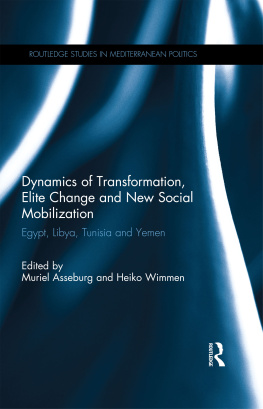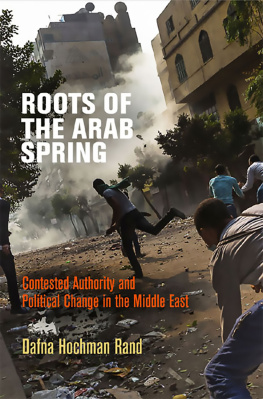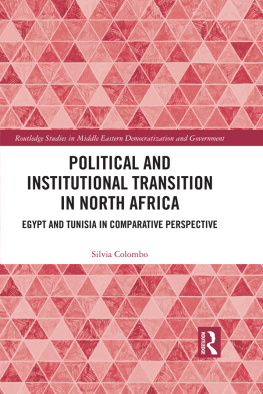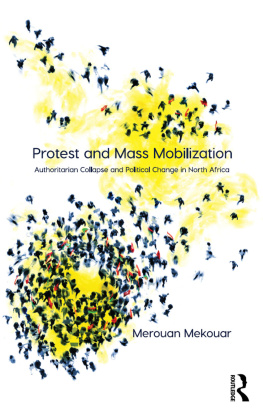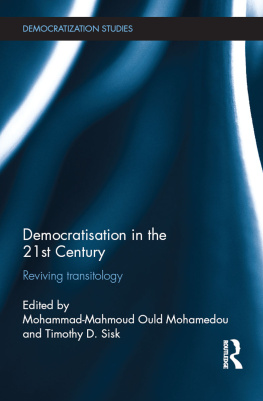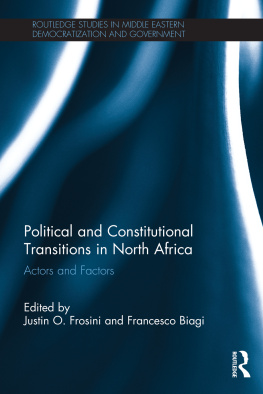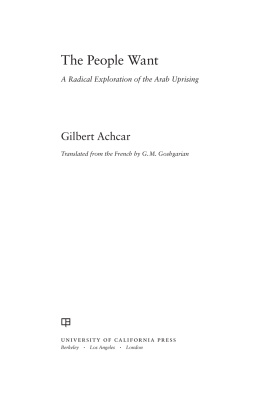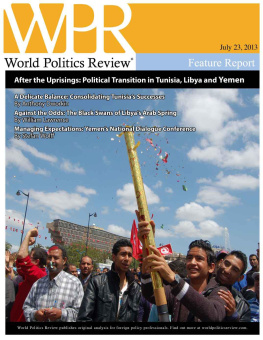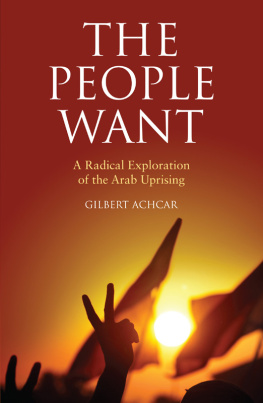Dynamics of Transformation, Elite Change and New Social Mobilization
The political transformations initiated by the so-called Arab Spring in Egypt, Libya, Tunisia and Yemen have been marked by strong political contention, continued social mobilization and, albeit to different degrees, weak central state institutions. This book proposes that, rather than agreed roadmaps of institutional change (e.g. elections, drawing up new constitutions) and centrally crafted transition processes, it has been the competition of key political actors for resources of political power and control that has set the pace and influenced the direction and depth of the transformation processes. Hence, the contributions in this volume use an actor-centred approach. Two perspectives are assumed: first key political actors referring to the Politically Relevant Elite (PRE) are identified and their motivations as well as their strategies and capacities to steer the transformation process. Secondly, the authors investigate the capacity of politically Mobilized Publics to exert influence on agenda setting and decision making, ask to what extent popular and social movements have emerged as political actors in their own right, and to what extent such forms of bottom-up participation have constituted a fundamental change to the political culture of these countries. Both avenues of inquiry analyze how the elites are constrained by continued social mobilization, how they engage with mobilized publics to promote their own agendas, and whether the extended scope of popular participation contributes to the legitimacy and stability of the emerging political orders, or causes disruption, fragmentation and conflict.
This book was previously published as a special issue of Mediterranean Politics.
Muriel Asseburg is a Senior Fellow in the Middle East and Africa Division of Stiftung Wissenschaft und Politik (SWP), the German Institute for International and Security Affairs in Berlin. Her research focuses on the Arab-Israeli conflict and questions of state building, political reform and political Islam in the Arab world as well as German, European and US Middle East policies. Recent publications include Protest, Revolt and Regime Change in the Arab World. Actors, Challenges, Implications and Policy Options (2012).
Heiko Wimmen is Project Director for Iraq, Syria and Lebanon at the International Crisis Group and is based in Beirut, Lebanon. In addition, he pursues a PhD project on political activism and social mobilization in divided societies of the Middle East and the Balkans. Recent publications include Syrias Path From Civic Uprising to Civil War (2016) and Divisive Rule. Sectarianism and Power Maintenance in the Arab Spring: Bahrain, Iraq, Lebanon and Syria(2014).
Routledge Studies in Mediterranean Politics
Series Editor: Frdric Volpi
University of St Andrews, Scotland
The Mediterranean Politics series takes an inter-disciplinary approach which, while generally focused on the disciplines of politics and international relations, also encompasses economics, human geography, sociology, and religious studies, in order to shed light on the interconnectedness of polities and societies in the Mediterranean region. The series takes the study of Mediterranean politics as a focal point to examine the global and transnational linkages between the Mediterranean area and the wider world. Showcasing cutting edge new research on regional, transnational and comparative politics, it provides a forum for the discussion of Mediterranean politics with special reference to the interaction between European and Middle Eastern & North African countries.
1. The Struggle for Influence in the Middle East
The Arab Uprisings and Foreign Assistance
Edited by Federica Bicchi, Benoit Challand and Steven Heydemann
2. Twenty Years of Euro-Mediterranean Relations
Edited by Richard Youngs
3. Civil Society and Political Reform in Lebanon and Libya
Transition and Constraint
Carmen Geha
4. Arab Spring and Peripheries
A Decentring Research Agenda
Edited by Daniela Huber and Lorenzo Kamel
5. Dynamics of Transformation
Elite Change and New Social Mobilisation
Edited by Muriel Asseburg and Heiko Wimmen
6. EU Neighbourhood Policy in the Maghreb
Implementing the ENP in Tunisia and Morocco before and after the Arab Uprisings
Iole Fontana
Dynamics of Transformation, Elite Change and New Social Mobilization
The political transformations initiated by the so-called Arab Spring in Egypt, Libya, Tunisia and Yemen have been marked by strong political contention, continued social mobilization and, albeit to different degrees, weak central state institutions. This book proposes that, rather than agreed roadmaps of institutional change (e.g. elections, drawing up new constitutions) and centrally crafted transition processes, it has been the competition of key political actors for resources of political power and control that has set the pace and influenced the direction and depth of the transformation processes. Hence, the contributions in this volume use an actor-centred approach. Two perspectives are assumed: first key political actors referring to the Politically Relevant Elite (PRE) are identified and their motivations as well as their strategies and capacities to steer the transformation process. Secondly, the authors investigate the capacity of politically Mobilized Publics to exert influence on agenda setting and decision making, ask to what extent popular and social movements have emerged as political actors in their own right, and to what extent such forms of bottom-up participation have constituted a fundamental change to the political culture of these countries. Both avenues of inquiry analyze how the elites are constrained by continued social mobilization, how they engage with mobilized publics to promote their own agendas, and whether the extended scope of popular participation contributes to the legitimacy and stability of the emerging political orders, or causes disruption, fragmentation and conflict.
This book was previously published as a special issue of Mediterranean Politics.
Muriel Asseburg is a Senior Fellow in the Middle East and Africa Division of Stiftung Wissenschaft und Politik (SWP), the German Institute for International and Security Affairs in Berlin. Her research focuses on the Arab-Israeli conflict and questions of state building, political reform and political Islam in the Arab world as well as German, European and US Middle East policies. Recent publications include Protest, Revolt and Regime Change in the Arab World. Actors, Challenges, Implications and Policy Options (2012).
Heiko Wimmen is Project Director for Iraq, Syria and Lebanon at the International Crisis Group and is based in Beirut, Lebanon. In addition, he pursues a PhD project on political activism and social mobilization in divided societies of the Middle East and the Balkans. Recent publications include Syrias Path From Civic Uprising to Civil War (2016) and Divisive Rule. Sectarianism and Power Maintenance in the Arab Spring: Bahrain, Iraq, Lebanon and Syria(2014).
First published 2017
by Routledge
2 Park Square, Milton Park, Abingdon, Oxon, OX14 4RN, UK
and by Routledge
711 Third Avenue, New York, NY 10017, USA
Routledge is an imprint of the Taylor & Francis Group, an informa business
Chapter 1 2017 Muriel Asseburg and Heiko Wimmen
Chapter 2 2017 Stephan Roll
Chapter 3 2017 Nadine Abdalla
Chapter 4 2017 Wolfram Lacher

